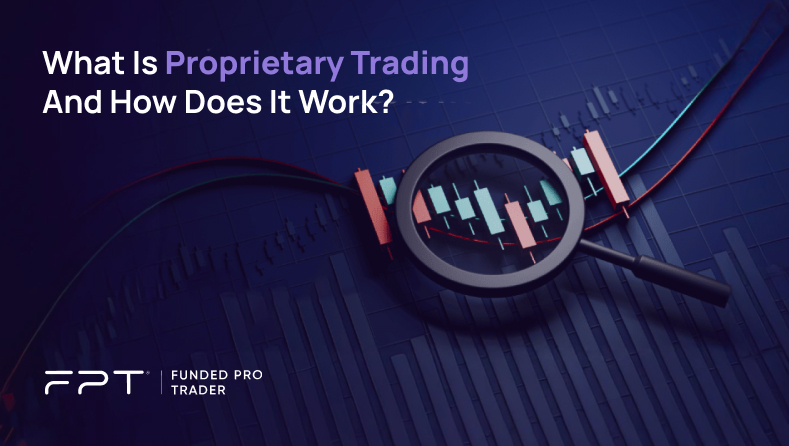
Forex Prop Trading 101: Everything You Need to Know
In the world of finance and trading, proprietary (prop) trading has become increasingly popular. This unique approach allows traders to trade with a firm's capital, opening doors to more extensive financial resources and profit potential. But what exactly is prop trading, and how does it work? In this article, we dive into the fundamentals of prop trading, explore the advantages and risks, and outline how traders can get started.
What is Prop Trading?
Prop trading refers to proprietary trading, where a firm, rather than individual traders, invests its own capital in financial markets. Unlike trading on behalf of clients, prop trading firms make trades to generate direct profits, usually through skilled traders who share the profits earned. This model has emerged as a promising pathway for traders looking to scale up without risking personal funds.
What is a Prop Trading Firm?
A prop trading firm provides traders access to firm-owned capital. Unlike traditional brokerage firms, prop firms don’t earn commissions or fees from clients. Instead, their revenue is directly tied to the profits generated by their trades. These firms may specialize in various financial markets, including stocks, forex, and commodities.
Prop trading firms evaluate and select skilled traders through challenges and evaluations, where successful candidates can access the firm’s capital in exchange for a share of the profits.
What is a Prop Trader?
A prop trader is an individual who trades on behalf of a proprietary trading firm, using the firm’s capital to execute trades. This setup allows traders to work with more capital than they might have personally, benefiting from profit-sharing arrangements rather than managing the complexities of capital funding. Prop traders are often skilled in different trading strategies, such as forex, futures, and options, and may specialize in specific market segments.

How Does Prop Trading Work?
In prop trading, traders typically begin by undergoing an assessment or “Prop Trading challenge” set by the firm to demonstrate their skills. Upon passing the assessment, they are provided with access to a funded trading account. The firm offers ongoing access to this account based on the trader’s performance, and both parties share any profits made, with the firm often taking a small share to cover costs and risks.
Many prop trading firms also include risk management protocols, which might involve stopping a trader's activity if losses exceed a certain amount. These protocols safeguard the firm's capital and create a controlled environment for traders.

An Example of a Proprietary Trading Desk
Consider a hypothetical prop trading firm that offers capital to qualified traders. Upon completion of a 30-day assessment period, traders who meet performance benchmarks receive access to a $50,000 account. The firm sets daily and maximum loss limits while also providing technical support and trading resources. Each month, the trader can earn a percentage of the profits generated, with the firm covering any losses. This setup gives traders access to more capital and the opportunity to earn substantial returns without personal financial risk.
How Do Prop Firms Work?
Prop firms operate by selecting traders with potential through a selection process, usually an assessment or challenge that tests a trader’s ability to manage risk and make consistent profits. Successful traders are then allocated firm capital, and profits are shared between the trader and the firm. Prop firms commonly provide educational resources, mentorship, and risk management systems to help traders succeed.
How Do Prop Firms Make Money?
Prop firms earn by sharing in the profits generated by traders. They take on the initial risk by allocating capital, but they manage this risk through stringent evaluations, risk management protocols, and sometimes modest monthly fees or challenge fees. By sharing in profits rather than taking commissions, these firms align their interests with those of the traders, fostering a collaborative and mutually beneficial relationship.
Advantages of Prop Trading
- Access to Significant Capital: Traders can trade with much larger sums than they might personally have.
- Profit Sharing Without Personal Risk: Traders can earn profits without risking personal funds.
- Structured Growth Opportunities: Prop firms provide resources, mentorship, and technical support to help traders advance their careers.
- Risk Management Support: Firms implement risk management practices to protect both the firm and the trader.

How to Get Started with Prop Trading
- Develop Skills and Strategies: Successful prop traders have robust trading strategies and understand risk management.
- Research Prop Firms: Look for firms with transparent policies, reasonable profit splits, and solid support systems.
- Pass Evaluation Challenges: Most firms require new traders to pass an evaluation. Prepare for this by focusing on consistent and controlled trading.
- Practice Responsible Risk Management: Prop trading requires careful risk management. Many firms will terminate funding if a trader experiences significant losses.
The Bottom Line
Prop trading offers unique opportunities for traders seeking capital access without risking personal funds. While it comes with pressures, such as meeting performance standards and handling profit splits, prop trading can open doors to substantial profit potential, industry resources, and growth. As the financial industry evolves, prop trading remains an appealing option for disciplined, skilled traders who wish to maximize their career potential.
Frequently Asked Questions
What is prop trading?
- Prop trading, or proprietary trading, involves trading using a firm’s capital rather than personal funds, with profits shared between the trader and the firm.
What is a prop trading firm?
- A prop trading firm provides access to capital, enabling skilled traders to trade in financial markets without risking personal funds. Profits are shared based on the firm’s arrangement.
What is a capital allocation program?
- A capital allocation program allows traders to access a specified amount of capital from the firm to trade, often determined by passing an assessment or meeting performance benchmarks.
Why do prop firms provide traders with funding?
- Prop firms provide funding to leverage skilled traders’ expertise, sharing in profits made from successful trades while helping traders grow.
What is the upside for traders joining a prop trading firm?
- Joining a prop trading firm offers traders access to more capital, risk management support, and a structured environment to develop their trading skills without risking personal funds.
Is prop trading risky?
- Prop trading involves risk, especially as firms set performance standards. However, risk is typically managed through firm-imposed trading limits and protocols.
Do I need to be an experienced trader to join?
- While requirements vary, many prop firms seek traders with some experience and a sound understanding of trading principles and risk management.
Can I join a capital allocation program for free?
- Some firms may offer free trials or waive fees in promotions, but typically, firms charge for evaluations to assess trader skill before providing capital.
What is the main advantage of Funded Pro Trader Select?
- Funded Pro Trader Select allows traders to access top-tier resources, skilled mentorship, and capital that helps them grow their trading career without personal financial risk.
How does Funded Pro Trader Select help traders to grow?
- Funded Pro Trader Select offers resources like educational materials, risk management guidance, and access to higher capital, supporting traders’ growth and success in the trading world.


















